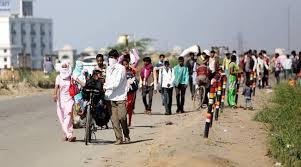The rights of labourers and workers who earn daily salaries have not been adequately protected by the Indian government throughout the exceptional worldwide crisis caused by the coronavirus epidemic. Through this time of crisis, they turned into one of the most endangered groups in India. State governments raised the maximum labour hours of work from eight to twelve hours, notably in Gujarat, Uttar Pradesh, Madhya Pradesh, Himachal Pradesh, and Punjab.
Ordinances that suspended most labour rules pertaining to workers paid a daily or weekly salary were approved in the states of Madhya Pradesh and Uttar Pradesh. A total of 38 labour rules were suspended by an ordinance issued by the Uttar Pradesh government. The Uttar Pradesh government rescinded this contentious order in response to a High Court ruling on these conditions, while the others are still in effect. These adjustments were meant to ensure flexible employment rules, which will draw in more investment and boost economic development following the shutdown. These modifications ignore worker safety in light of the COVID-19 epidemic as well. Thousands of individuals are still at danger despite the comparatively low fatality rate of the COVID-19 virus when considering the 2.6 million-person large migrant work population from India.
IMPACT ON WORKERS WHO MIGRATE
This epidemic struck migrant labourers the hardest. They had to go hundreds of kilometres on foot, together with children and pregnant women, because they had no way to get lodging or transportation. This puts them at danger for both the virus and the fury of the authorities who are implementing COVID-19 restrictions.
An extensive number of migrant labourers experienced abrupt job loss due to the countrywide lockdown. Given that the majority of labourers get a daily income, they were confronted with difficulties during lockdown but lacked the necessary information and resources. Rather of taking action to protect them, the government chose to suspend many laws that protect their work rights.
Approximately 90% of migrant workers did not get a government subsidy and were not paid by their employers, according to a study of 11,159 workers from different states. Employers are immune from the Industrial Disputes Act 1947, which exposes workers to harassment by their employers and grants them the right to be fired at whim, according to an ordinance issued by the Uttar Pradesh government. There exists a genuine risk that the easing of labour laws in certain states may also extend to other regions of the nation. The Indian Constitution places labour on the concurrent list, meaning that both the federal and state governments have the authority to amend specific clauses. Modifications must be authorised by the national government and be legal. But rather than being designed to safeguard workers, the laws being enacted amid the epidemic are abusive.
What Judiciary Thinks
The situation of crisis was unnoticed by the Indian Supreme Court. In response to a petition submitted by Indian Law Institute labour law specialist Alakh Alok Srivastava, the government stated that 2.2 million migrant workers received food and 600,000 were housed in government shelters. Hundreds of thousands of other migrant labourers who ended up homeless on the streets across the nation were not taken into consideration by the court. In a statement, the Solicitor General stated that “not a single migrant was walking” as of March 31, 2020, at 11 a.m. Even while reports of migrant workers becoming lost on the streets were coming in from all over the nation, the Supreme Court agreed to these assertions. Thus, while a large number of labour regulations were being banned by the states, the Supreme Court and the Executive chose to ignore these issues.
The High Courts, however, addressed the situation of labourers in a more suitable manner. The state administration was censured by the Karnataka High Court for obtaining transportation costs from the workforce. In order to comply with the national policy of enabling “a migrant worker with no source of livelihood and is not in a situation to pay railway fare” to return home, it requested confirmation from the state government to the Court. Tents for homeless migrants are to be erected, per the directives of the Andhra Pradesh High Court. Because midday meals are unavailable to children from lower socioeconomic classes, particularly children of labourers, the Patna High Court took suo moto cognizance of their suffering.
The necessity of protecting workers’ rights
All people have intrinsic human rights, regardless of their background or gender. Adopted in 1998, the ILO Declaration on Fundamental Principles and Rights at Work asserts that social progress and justice cannot be guaranteed solely by economic growth. However, while workers all around the nation are fighting to obtain necessities for survival, the Indian government is concentrated on expanding possibilities for investment to boost foreign investment and get the country’s economy back on track. The unstable living situations of labourers are being blatantly disregarded in this unparalleled worldwide crisis brought on by COVID-19, and the government is incorrectly viewing them as products that should be risked in the name of economic expansion.
BY- Spersh Gupta (Intern)

